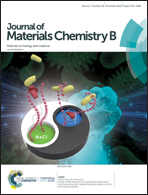Transferrin receptor-targeted redox/pH-sensitive podophyllotoxin prodrug micelles for multidrug-resistant breast cancer therapy†
Abstract
Podophyllotoxin (PPT), a toxic polyphenol extracted from the roots of Podophyllum species, showed remarkable activity against P-glycoprotein (P-gp) mediated multidrug resistant (MDR) cancer cells. Many PPT-prodrugs based on nano-technology have been developed for increasing aqueous solubility and reducing the side effects of PPT; however, the sensitive linkers in almost all PPT-prodrugs were ester bonds, resulting in slow and incomplete drug release. We developed a redox/pH double-sensitive and tumor active targeted drug delivery system for PPT delivery, in which PPT was covalently coupled to T7-peptide (Pep) modified polyethylene glycol (PEG) or methoxy-polyethylene glycol (mPEG) through a disulfide bond to obtain the final polymer (Pep-PEG-SS-PPT or PEG-SS-PPT). The mixed micelles (Pep-SS-NPs) were made by mixing Pep-PEG-SS-PPT with PEG-SS-PPT, and the mixed micelles showed good size uniformity and high stability in serum solution. The in vitro release experiment showed that about (81.7 ± 2.8)% PPT was released from Pep-SS-NPs in 10 mM glutathione (GSH) at pH 7.4, and also about (64.6 ± 1.7)% PPT was released from Pep-SS-NPs at pH 5.0. In vitro cytotoxicity analysis suggested that Pep-SS-NPs exhibited 57- to 270-fold lower resistance index (RI) values for different drug-resistant cancer cell lines than paclitaxel (PTX) or docetaxel (DTX). The cell uptake assay indicated that the Pep-SS-NPs could significantly enhance the intracellular level of coumarin-6 compared to that of the control group. The maximum tolerated dose (MTD) of Pep-SS-NPs was increased greatly compared to that of free PPT (5.3-fold). In vivo research showed that Pep-SS-NPs significantly enhanced antitumor efficacy against MCF-7/ADR xenograft tumors compared to the control groups. These findings suggest that mixed micelles could be a potentially successful nanomedicine for MDR breast cancer therapy.



 Please wait while we load your content...
Please wait while we load your content...